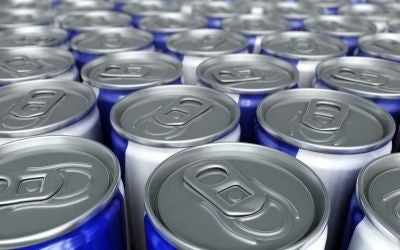Sale of energy drinks banned by Middlebury College for fear students will take part in ‘high-risk sexual activity’
Minutes from Community Council meeting show member reject idea of gathering student views first, and says: 'People who are upset about it will get over it'

Your support helps us to tell the story
From reproductive rights to climate change to Big Tech, The Independent is on the ground when the story is developing. Whether it's investigating the financials of Elon Musk's pro-Trump PAC or producing our latest documentary, 'The A Word', which shines a light on the American women fighting for reproductive rights, we know how important it is to parse out the facts from the messaging.
At such a critical moment in US history, we need reporters on the ground. Your donation allows us to keep sending journalists to speak to both sides of the story.
The Independent is trusted by Americans across the entire political spectrum. And unlike many other quality news outlets, we choose not to lock Americans out of our reporting and analysis with paywalls. We believe quality journalism should be available to everyone, paid for by those who can afford it.
Your support makes all the difference.A university in the US has been encouraging debate after taking the decision to ban the sale of all energy drinks on campus for fear they will cause students to participate in “high-risk sexual activity.”
The Dining Services at Middlebury College in Vermont reportedly distributed a flyer among the student body which, according to the college student newspaper, The Middlebury Campus, revealed a scientific connection between the consumption of the drinks and “unsafe behaviour in young people”
Energy drinks, said the flyer, cause “increased alcohol consumption, increased likelihood to drive while intoxicated, increased probability of use of other intoxicating substance, and increased participation in high-risk sexual activity.”
According to its section on the Middlebury College site, Dining Services outlines its mission as being to “nourish and nurture today and tomorrow by sustaining mind, body, and earth.”
However, it was a recent American studies undergraduate and now intern with the food provider, Myles Kamisher-Koch, who took issue with the mission statement and argued at a Community Council meeting that it didn’t reflect its message accurately so long as energy drinks were available on campus.
The college’s Community Council says it serves as a forum in which all segments of the college community have a voice on non-academic issues it faces, adding: “With a membership representing students, faculty and staff, deliberations and decisions consider the interests and concerns of the whole community.”
With several Dining Services staff members agreeing with Mr Kamisher-Koch, according to The Middlebury Campus, he presented the council with data from a study which stated that “up to 25 per cent of current drinkers combine alcoholic beverages with energy drinks.” He further added that the drinks promote “poor academic tendencies” which led to a “culture of stress.”
When asked if a survey should be conducted among the student body, according to the minutes of the council meeting where the banning of the sale of the drinks came into effect, council member Emma Bliska said: “I’m not sure a survey is necessary.
“I understand why the Student Government Association (SGA) is concerned, but we’re here to do the right thing and the right thing is to pass this because energy drinks shouldn’t be on this campus. People who are upset about it will get over it.”
Another member, Brandon Baird, opposed the ban and told the meeting: “I’m not in support. From a personal statement, I agree with all the literature. I do think it’s a personal infringement on rights. I don’t drink energy drinks, alcohol, or coffee but I don’t think it’s my place to tell someone else.”
Again, when pressed about gathering student opinion prior to the ban, Miss Bliska said: “Polls are kind of a waste of time. The whole point of a representative body is that you don’t have to poll everyone.”
In the end, eleven voted in favour of the ban, while one member opposed, and two abstained.
The aforementioned flyer also reportedly backed-up Mr Kamisher-Koch’s arguments, and read: “Consuming these products may result in serious health-related issues such as; cardiovascular events, seizures, and liver damage.”
The decision, though, was made final by Dining Services’ executive director of food service, Dan Detora, who signed off on the campus literature. Speaking with NBC News, Mr Detora remained unyielding on his stance to ban the drinks, and said: “I see it as the equivalent of banning cigarettes.”
Join our commenting forum
Join thought-provoking conversations, follow other Independent readers and see their replies
Comments